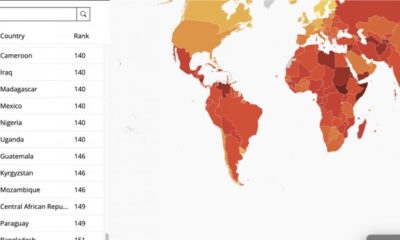Special Features
Kogi, Bauchi, Ebonyi… some states with high cost of living in Nigeria

In this post, News360 Nigeria highlights 10 most expensive states in Nigeria in 2024.
The soaring costs of utilities on a daily basis have made everyone concerned about Nigeria’s current economic situation.
Nowadays, the average Nigerian can hardly afford to buy himself and his family a single square meal a day. Every sector is affected by the rise in consumer goods prices, which is a primary cause of inflation.
Increasing transportation costs and security issues in agricultural areas are two more factors that complicate this issue.
These article provides a clear picture of the economic hardships Nigerians face across the country.
1. Kogi State
Topping the list of some States with high cost of living is Kogi State which is located in North Central Nigeria.
With an estimated 4.5 million residents, the state’s economy is primarily based on agriculture. The principal crops grown there are yams, coffee, cashew, groundnuts, cocoa, and oil palm. The extraction of crude oil and the herding of cattle, goats, and sheep are two other important industries.
The cost of living in the state is high despite its abundance of natural resources because there has reportedly been a 44.7% increase in the price of food and transportation for its residents.
2. Oyo State
Situated in Southwest Nigeria, Oyo State’s capital city, Ibadan, is ranked as the second most populous city in Africa and the third most populous city in the nation.
The state’s economy still depends heavily on agriculture. Oyo State’s economy depends heavily on tobacco, cocoa, and cassava among other crops.
The state comes in second on this list with an approximate 31.3% inflation rate, which has raised the state’s standard of living.
3. Rivers State
With roughly 8 million residents, Rivers State is the seventh most populous state in Nigeria and ranks third on this list.
Despite having a thriving petroleum industry, the state still sees high rates of inflation in its food, transportation, security, and healthcare sectors.
4. Lagos State
Lagos is a state in southwestern Nigeria. It has the smallest total area and the highest population.
With an all-items inflation rate of 34.3%, it is among the most expensive states. This means that food prices, housing costs, transportation costs, and general living standards have all increased.
5. Akwa-Ibom State
Akwa Ibom State is a state in the Southern and is prominent for its natural resources, ethnic cultures, and modern attractions, making it a top destination for tourists.
The state records an inflation rate of 33.16% despite it’s dependence on Agriculture.
6. Abia State
The economy of Abia State, which is in southeast Nigeria, is centered on the extraction of natural gas and crude oil, as well as agriculture, primarily yams, maize, taro, oil palm, and cassava. Manufacturing is also important, particularly in Aba, which acts as the state’s commercial hub.
Notwithstanding all of these benefits, the state’s overall cost of living, transportation costs, and food prices have significantly increased.
7. Ebonyi State
Ebonyi State, in southeast Nigeria, has a population of roughly 2.1 million, and its cost of living has increased by more than 32.6%.
The state has a small population in the nation and relies heavily on agriculture for its economic growth, primarily from the production of rice, yams, oil palm, and cassava.
The lead, zinc, and limestone deposits near Abakaliki, along with the production of handcrafted baskets by locals, have made mining a significant minor industry.
8. Ondo State
Ondo State is a state in Southwestern Nigeria dominated by the Yoruba speaking people. The petroleum industry is the main driver of the state economy.
Other aspects of the state’s economy include the production of cocoa, asphalt, and activities associated with its vast coastline.
The state has an inflation rate of 32.33% causing an increase in food prices and overall cost of living.
9. Osun State
Osun state is economically dependent on agriculture, mainly of cocoa, cassava, millet, maize, potato and yam crops.
Along with livestock herding and artisanal mining, services are other important industries, particularly in urban areas.
Because of the state’s 32.31% annual rate of inflation, living expenses have increased.
10 Bauchi State
Bauchi State is a state in the North-East part of Nigeria. With sophisticated irrigation systems boosting agricultural output since the state’s founding, the economy of the region is centered on cattle and crops like cotton, yams, tomatoes, groundnuts, and millet.
Other industries include tin and columbite mining, as well as food processing and canning facilities.
Despite these industries, the cost of living in Bauchi State is high, with an inflation rate of 31.6%.
































